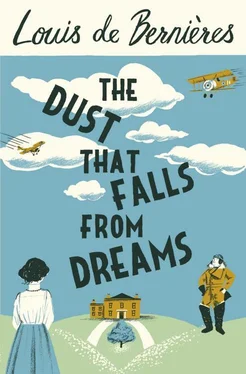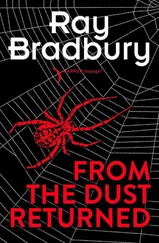He rolls one and a half, pretends he has an enemy on his tail, and immelmanns. He gets on the tail of his enemy and then waggles his wings in wild exaggeration. He banks and follows the contours of a feathered canyon. An SE5 appears out of nowhere, and he realises that it is McCudden. They play hide-and-seek for a while, dipping in and out of the gaps between the clouds, chasing each other round and round a funnel, and then McCudden waves and disappears.
At this point Daniel realises that his voice has gone hoarse from too much gleeful shouting and singing, and that he has no idea where he is. He descends in a shallow dive. He once had his engine stop in a cloud, because of moisture in the jet, and ever since he has worried that it will happen again. You have to come out cautiously too, because you do not know what might be underneath, and without a horizon you can easily end up flying upside down. At forty-five degrees the rudder becomes the elevator and vice versa. You can make horrendous mistakes. He cuts the engine with the button switch and glides down through the cloud, keeping an eye on the bubble of the spirit level, listening excitedly to the harmony of the wires rising in pitch and volume as his speed increases. You can tell how fast you are going, because of the harmony of the wires. These wires were made originally for pianos. And ploughshares shall be beaten into swords. The pristine white clouds are wisps of drifting and swirling ghostly greyness inside. It is one of life’s small disappointments. He notices that, as always seems to happen with Camels, his right foot is drenched in engine oil.
Underneath, to his absolute chagrin, he spots an enemy two-seater, taking photographs over Poelcapelle. It is a Roland Walfisch, which once upon a time had been Daniel’s favourite German aircraft. It is dumpy, with a window on either side for the observer, and has the upper wing lying across the top of the fuselage, just as the Dolphin does. If you turn it over, you support the entire weight of the aircraft with your head.
It is obsolete, and Daniel has not seen one for months. It occurs to him that this might be the last one left in service. He feels a bitter contempt for whoever it was that ordered this machine out on a mission. Then he suspects a trap. He switches his engine on.
He turns and blots out the sun with his thumb. He sees nothing. He glances around for the flash of wings, for tiny silhouettes in the distance, and again sees nothing. The British archie notices him and stops firing at the Roland, so now the crew of the German aircraft know that there must be an Allied craft nearby. The observer spots him and cocks his Parabellum. He taps the pilot on the shoulder, the pilot looks round and up, puts the nose down and streaks for home.
He hasn’t got a chance, however, because Daniel has the advantage of height and can dive at whatever speed he likes. Even on the flat he can outrun a Walfisch. He curses. Who is this demon who throws a spanner in the works when you’re just out harmlessly stunting in the clouds? He is not in the mood for killing after so much fun.
Nor is he in the mood for being killed. A scout should not attack a two-seater on its own, even an obsolescent one, unless it can surprise it by coming up from underneath. For a good observer, a scout coming from above is a sitting duck. Daniel thinks of breaking away. If he has the wind up, it is the rational wind up.
He opens fire from a hundred yards, too far away to be effective. The observer fires a short burst, and Daniel sees the streaks of tracer passing between his wings on the starboard side. ‘Damn, damn, damn,’ he says between gritted teeth, as he presses on.
The tracer stops, and he is within killing range when he sees that the observer is struggling with his machine gun, which has jammed. The observer is in a rage of panic and frustration. Daniel is only a few yards away and is certain of an easy kill. The observer thumps the gun with his fist, and then, amazingly, furiously wrenches it from its mounting and hurls it overboard.
Like an executioner testing the edge of his axe, Daniel does not open fire as he easily follows the weaving and diving of the Roland. Daniel notes that this is the kind of Walfisch that has no forward-firing gun. He draws alongside, and the pilot looks at him wonderingly. Daniel stabs his finger at him and puts his own arms up briefly to signify that he is demanding surrender. You don’t take your hands off a Camel’s controls for any longer than you have to.
The pilot looks round at his observer, and nods, and the observer puts his hands up. Daniel fires a brief burst to signify that he demands cooperation, and then points in the rough direction of his aerodrome. The pilot nods and they fly side by side at eighty miles an hour. The observer is dejected and sits with his face in his hands. Daniel reflects that the day hasn’t been spoiled after all, and for some reason he begins to think about the lovely house in Eltham where he used to live, before his father was killed. There were four girls living next door, Ottilie, Christabel, Sophie and Rosie. Rosie with the startling blue eyes and chestnut hair. She had been his ideal girl when he was a boy. He thinks, ‘I wonder if they’re still there? If I get through this, I’m going to call on those girls.’ He gets a warm feeling in his guts thinking about them. A house with four girls!
Back at the aerodrome the squadron leader, Major Maurice Beckenham-Gilbert, known as ‘Fluke’, emerges from his hut, and all the ack emmas, pilots and ground staff come out to admire the captive machine, which has landed first. Daniel comes in second, blipping his engine and side-slipping to reduce speed. He volplanes into a perfect three-pointer, which is just as well in front of so many people. Everybody shakes hands with the German crew and has their photographs taken with them and Daniel in front of the Walfisch.
The crew are taken into the mess and offered tea or cognac. They choose cognac. Daniel says, ‘ Sprechen Sie Englisch? ’ and the two men shake their heads. ‘ Français? ’ and they both say, ‘ Oui, un peu .’ The pilot supplements this with ‘ Un très petit peu .’
‘Je suis content de n’avoir pas eu le devoir de vous abattre .’
‘ Abattre? ’ questions the observer.
‘ Tuer ,’ says Daniel.
‘Ah,’ says the observer. ‘ Nous aussi. Mais vous avez eu beaucoup de chance, n’est-ce pas? Que la mitrailleuse n’a pas marché? ’
Major Beckenham-Gilbert interrupts. ‘Daniel, be a good fellow and translate, unless you can get them to talk in ancient Greek. Latin would do.’
‘I said I was glad that I didn’t have to kill them, and they said I was lucky that their guns were jammed.’ He turns back to the two Germans.
‘ Oui, j’ai eu de la chance. Je trouve que votre machine est très beau, j’ai toujours aimé le Walfisch. Je n’aimerais pas détruire le dernier. Ça serait triste. Plus tard je veux bien l’essayer .’
‘ Oui ,’ answers the pilot.’ Elle est belle mais elle est vachement vieille. J’espère qu’elle est la dernière. Je n’ai pas offert de me suicider .’
‘I said yes I was lucky, and I think the Walfisch is a lovely bus, one of my favourites. I said I was glad not to have shot it down, and I’m going to give it a spin later.’
‘Me too,’ says Beckenham-Gilbert. ‘Might be a good idea to paint out the crosses, though, and splash on some roundels. The last person to take a captured machine up for a spin got shot up the arse by a French farmer with an antique rifle.’
‘And the pilot said,’ continues Daniel, ‘that it’s too old, and he’d never volunteered to commit suicide, and I am going to reply that we all offer ourselves up for suicide every day. On s’offre à la suicide chaque jour .’
Читать дальше












